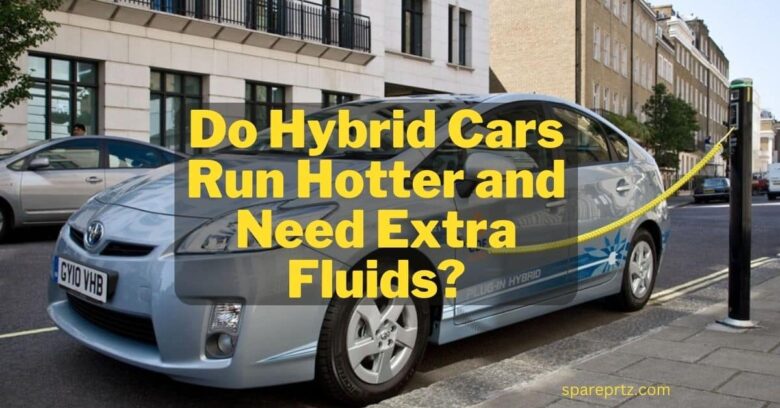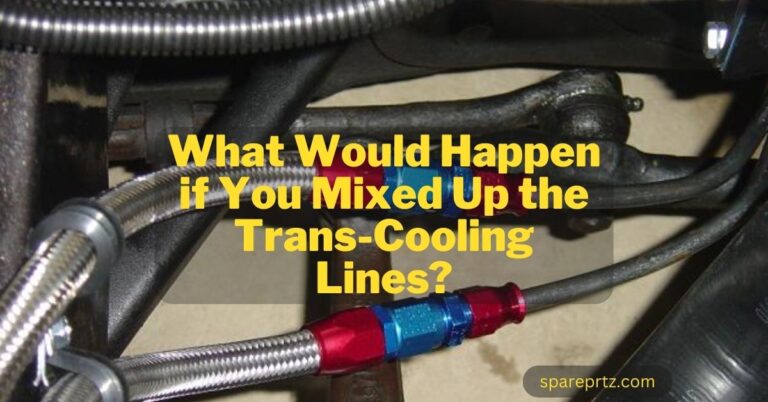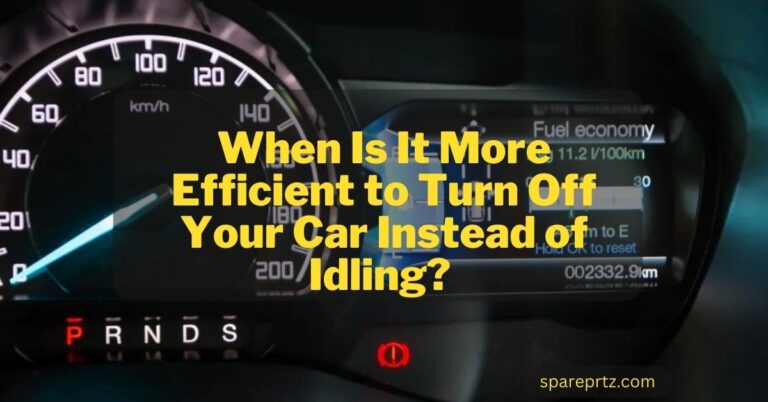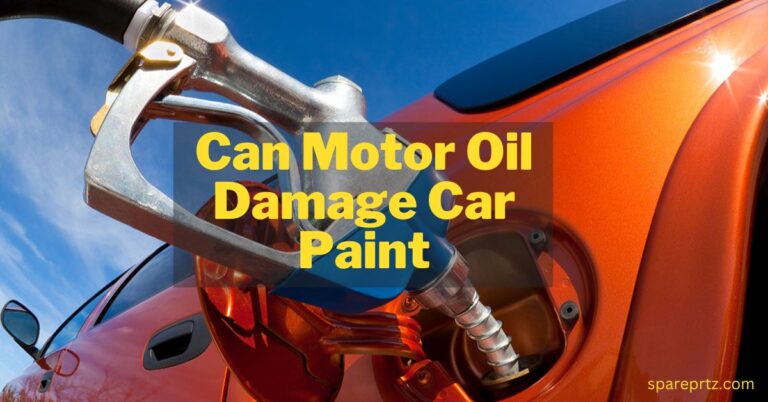Do Hybrid Cars Run Hotter and Need Extra Fluids? – Unveiling the Green Engineering
David decides to change his standard vehicle and wants to purchase a brand-new Hybrid car. David came to know that Hybrid vehicles are popular due to their low fuel consumption and environmental friendliness. But despite this, David also heard some misconceptions regarding Hybrid performance. These misconceptions are particularly in terms of engine heat and fluid consumption.
Let’s have a look at misconceptions Do Hybrid Cars Run Hotter and Need Extra Fluids? We may observe hybrid vehicles’ effectiveness, cooling mechanisms, and fluid management by understanding their engineering principles and technology innovations.
- 1 Is Engine Oil Essential for Hybrid Vehicles?
- 2 Now Have a Look at the Engine Efficiency in Hybrid Vehicles:
- 3 The Working of Hybrid Car Cooling Systems:
- 4 Fluid Requirements for Hybrid Vehicles:
- 5 Hybrid Vehicle Lubrication Issues:
- 6 Why Is Special Engine Oil Required for Hybrid Vehicles?
- 7 Hybrid Cars Are Eco-Friendly:
- 8 Conclusion:
- 9 Most Related Articles:
Is Engine Oil Essential for Hybrid Vehicles?
Well, the answer is yes, without any doubt. Every hybrid vehicle uses an internal combustion engine, just like ordinary cars, which requires continuing lubrication. As compared to ordinary cars, a hybrid car also requires fluid, and maintenance is required with an additional electrical combustion system; there is significantly more to repair and maintain! It implies that hybrid vehicles require the same fluids as combustion automobiles, such as gearbox oil for smooth gear shifting and coolant for the engine to avoid overheating.
To understand theories concerning engine heating and fluid requirements in hybrid automobiles, first, we should know how a Hybrid system Operates.
A hybrid works with a combination of an ignition engine, an electric system, and a battery, with the motor and other technologies with energy recovery for charging the battery. We can count hybridization into three types: Mild hybridization, full hybridization, and plug-in hybridization.
Mild Hybrid Electric Vehicles (MHEVs)
MHEVS is powered mainly by a combustion engine with an additional electric section to assist it in running more efficiently. They work in cycles, and the car can’t operate just on electricity.
Full hybrid electric vehicles (FHEVs)
FHEVs have a combustion engine, a giant battery, and motors that can handle higher power. Regenerative braking is a common feature that works similarly to Formula 1 cars. In FHEVs, it transforms the kinetic energy of the automobile into power to recharge the battery. Depending on the model, they might be able to run in “electric only” mode.
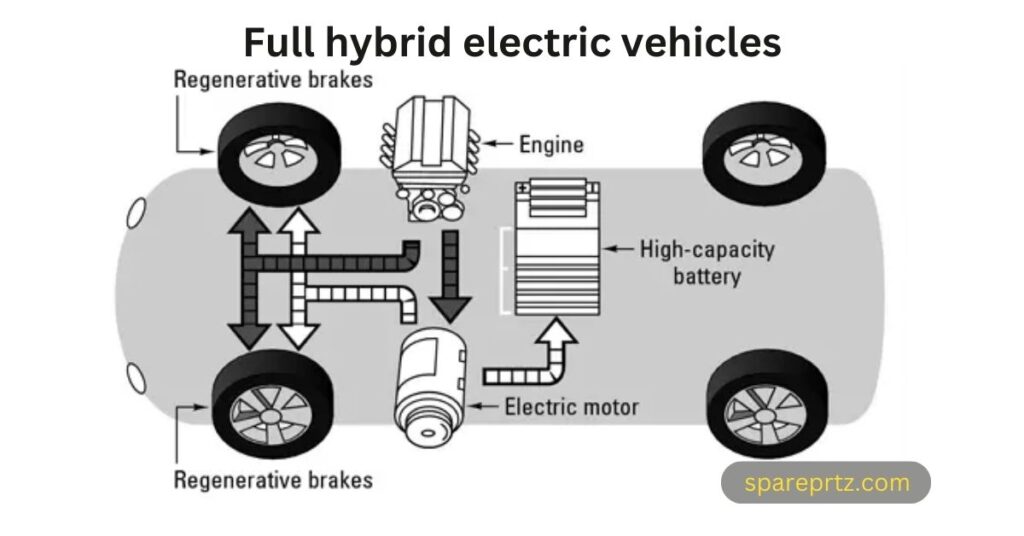
Plug-in hybrid electric vehicles (PHEVs)
PHEVs can be charged by plugging into a different power source. They may function purely on electric power for short distances. PHEVs are an excellent choice for drivers who live or work near cities with limited emissions zones.
Now Have a Look at the Engine Efficiency in Hybrid Vehicles:
It’s a common misconception that due to the integration of electronic components, hybrid car engines run hotter. But practicality, hybrid vehicles are designed to maximize engine efficiency and minimize heat generation.
Hybrid automobiles work under different driving situations. It’s due to the combination that includes a petrol engine and an electric motor.
While driving in cities or at a slow speed, the electrical motor takes over. This lessens the load and heat output from the petrol engine. The petrol engine gets activated when the speed is increased, or more power is needed. By distributing the load evenly, it reduces extra heat.
The Working of Hybrid Car Cooling Systems:
Hybrid vehicles have an advanced cooling system. These cooling systems for the electric components have a built-in electric motor and power source. These systems are designed to efficiently manage engine temperature while sustaining top performance.
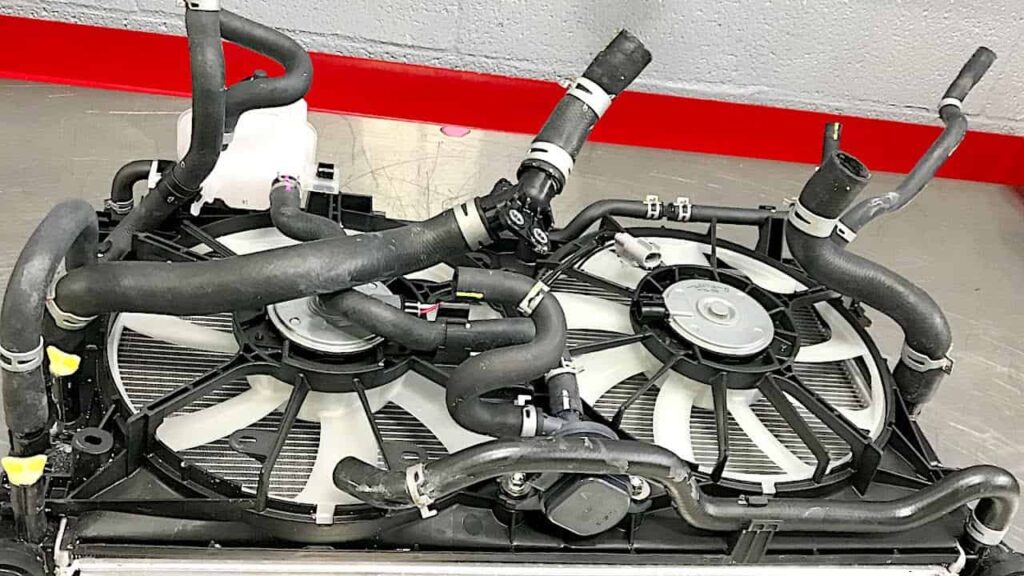
Most hybrid vehicles use typical cooling systems and electric cooling motors to control engine temperature. These electric cooling motors ensure that essential cooling is provided either when the engine is off or only operating at low loads.
This avoids overheating and maintains smooth performance, even in stop-and-go traffic or when idling for an extended time period.
Fluid Requirements for Hybrid Vehicles:
Another misconception is that hybrid vehicles require more fluids than regular automobiles. But practically, hybrid automobile fluid requirements are the same as ordinary cars. It’s even low in some situations.
Regenerative braking is a common feature in hybrid cars. It turns braking force into power and saves it in the battery. As a result, the system for regenerative braking minimizes the weakening of brake pads. Requiring less brake fluid changes.
Some hybrid vehicles have a continuously variable gearbox (CVT) rather than standard automatic transmissions. CVTs use less gearbox fluid as they have fewer moving parts. It improves fuel efficiency and makes maintenance easier.
Hybrid Vehicle Lubrication Issues:
It’s a bit complex to have two energy systems as electric cars have some specific lubrication problems. Many hybrid automobiles initially run entirely on electricity and then switch to ignition engines once they gain a higher speed or increased load.
This shows that starting the engine is difficult under tough conditions. It requires the usage of engine oil with the particular properties required to provide ideal function and protection. In hybrids, upon the load division with the electrical powertrain, the ignition engines run colder and require additional lubrication.
So, the engine oils used for a hybrid must be of premium quality to withstand irregular use. Oil should also perform well at regular engine temperatures.
Hybrid vehicles’ infrequent use of the ignition engine is also a drawback. This causes a variety of problems, including acid generation, water formation, and troublesome wear.
Why Is Special Engine Oil Required for Hybrid Vehicles?
Engine oils for Hybrid are formulated to bear tough conditions and are more well-matched to lower working heat. They are durable to deteriorate over time, even when exposed to repeated cold starts or no start at all.
Other significant facts are fuel economy and pollutants. Engine oils that lack thicknesses are required for hybrid vehicles to maximize efficiency and minimize emissions. These oils must also be able to provide suitable lubrication and protection.
Using improper Engine Oils will reduce the fuel economy, and the emissions advantages of a hybrid system could also be reduced.
Engine oil for hybrid vehicles needs some specific formulation. So, it’s critical to follow the manufacturer’s directions while choosing the lubricants and to understand why hybrids need Specific engine oils.
Hybrid Cars Are Eco-Friendly:
Hybrid vehicles have several advantages, including reduced greenhouse gas emissions and better fuel economy. They are eco-friendly and offer reliable and clean operation due to their superior cooling methods and fluid management.
Conclusion:
Well, after solving the myth of misconceptions about hybrid vehicles. David came to know that Hybrid cars do not run hotter or need extra fluids than standard automobiles. Furthermore, it is understood that innovative liquid management, regenerative technology, and cooling mechanisms have been carefully built to maximize engine performance while reducing environmental pollution. Denying these myths will allow hybrid automobiles’ genuine efficiency and environmental friendliness.
Most Related Articles:
- What Is Round Cylinder On Top Of A Classic Car Engine? All About Air Filters in 2024
- Can You Use Pledge on Car Interior: Impact of Pledge on Different Parts of Car
- What Would Happen if You Mixed Up the Trans-Cooling Lines? – Disastrous Consequences
- Do Hybrid Cars Run Hotter and Need Extra Fluids? – Unveiling the Green Engineering
- How to Remove Sunscreen Stains From Leather Car Interior

